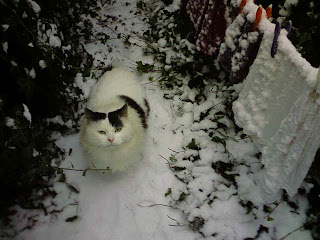Mr Grumpy wondering whether a cat might be able to get a grant to retrain as a polar bear.
Saturday, January 9, 2010
Monday, January 4, 2010
Tiger showing off her smart new splint
Tiger went up to the Veterinary Hospital to have her leg checked today, and she now has a smart newly bandaged splint instead of the old one which had got pretty grotty where she'd been digging in her litter tray. She also had an X-ray which showed the main lower leg bone is healing nicely, but the thinner one still needs support to keep the broken ends positioned together. It should be able to come off for good in another 10 days; then three more weeks cage rest while the bones are still in a weakened state.
Tiger isn't a stray, but was signed over to us because her owners didn't feel able to cope with a cat with a broken leg. She'll be up for rehoming once she's fully recovered.
Tiger isn't a stray, but was signed over to us because her owners didn't feel able to cope with a cat with a broken leg. She'll be up for rehoming once she's fully recovered.
Labels:
animal clinic
Sunday, January 3, 2010
Volunteering with the branch

Maisie, one of our injured strays
Volunteering opportunities with our branch probably don't fit the ideal image most people have of "helping at the RSPCA". Most of the animals we have up for rehoming are boarded at a private kennels, so we can't allow volunteers to just drop in and help out with dog walking etc. because this would mean disruption to the kennel owners' work caring for the private boarders.
A typical rescue case for us generally manifests via a call to the branch emergency phone from a private vet who has just received an injured stray with a log number from the RSPCA National Control Centre. This log number guarantees that the RSPCA will pay for emergency first aid. The Control Centre (NCC) is staffed 24/7 and responds to emergency calls from members of the public (or vets who have received injured strays directly). Sometimes an inspector or animal welfare officer will be sent out to deal with the situation (e.g. if the injured animal is dangerous), but if the finder has transport and can handle the animal they are usually requested to take it direct to a vet so that treatment can begin as soon as possible.
The National RSPCA pays the first £60 + VAT to get first aid started and the vet will then contact their local branch to fund continuing treatment and (hopefully) to rehome the animal once he or she is fit again.
This inevitably means that our rescues start off scattered all over our branch area, and we need to move them to our clinic for further treatment; to foster homes for recuperation, or to kennels for rehoming. Inevitably everything is guaranteed to happen at the most inconvenient time possible.
This is why we don't have many opportunities for people to come in and help with caring for the animals, but we always desperately need more foster homes and volunteer drivers.
If you might be able to help with either of these, please email: rosemary@rspca-cambridge.org.uk
Labels:
cats,
dogs,
rabbits,
volunteering with the rspca
Resolutions
"Raise more funds," has to be our motto going into 2010. Without money we can't pay vets to treat animals, or kennels to board them so that they can be rehomed.
You can help us by:
You can help us by:
- Buying items from our charity shops at 61 Burleigh St, Cambridge, 188 Mill Road, Cambridge and 156 High Street, Newmarket.
- Donating items to our shops (textiles and shoes can be sold for recycling even if they are worn out, but other items need to be in saleable condition).
- Volunteering in our shops.
- Volunteering to help with our yearly collection in RSPCA week at the end of April.
- Adopting animals from us so that they spend a shorter time in kennels, costing us boarding fees.
- Donating a percentage to us when you sell items on eBay.
- Buying second hand books online from our Abebooks store
Labels:
cat rehoming,
dog rehoming,
veterinary treatment,
volunteering
Subscribe to:
Comments (Atom)
.jpg)


